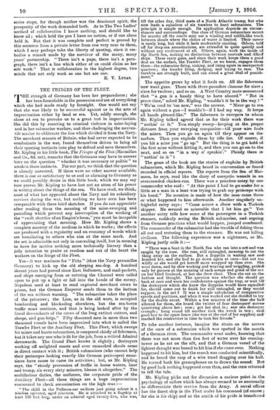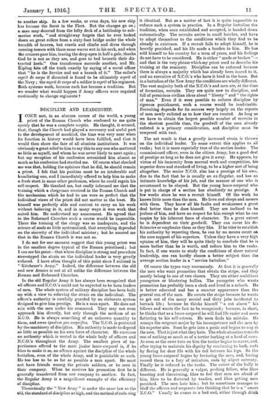THE FRINGES OF THE FLEET.
THE strength of Germany has been her preparedness ; she has been formidable in the possession and use of everything which she had made ready by foresight. One would not say that she was likely to be successful against us in the arts of improvisation either by land or sea. Yet, oddly enough, she chose at sea to provoke us to a great test in improvisation. She did this by resorting to criminal violence in mine-laying and in her submarine warfare, and thus challenging the mercan- tile marine to obliterate the lino which divided it from the Navy. The merchant seamen of Britain, who had never expected to be combatants in the war, found themselves driven to bring all their sporting instincts into play to defend and save themselves. Mr. Kipling in his little book, The Fringes of the Fleet (Macmillan and Co., 6d. net), remarks that the Germans may •have to answer later on the question " whether it was necessary or politic " to awaken those instincts. For our part, we think that the question is already answered. If there were no other answer available, there is one as satisfactory to us and as alarming to Germany as we could possibly desire in this little book, which we may say here proves Mr. Kipling to have lost not an atom of his power in writing about the things of the sea. We have read, we think, most of what has appeared about the Navy, and its subsidiary services during the war, but nothing we have seen has been comparable with these brief sketches: If you da not appreciate after reading them the meaning of the mine-sweeping and patrolling which prevent any interruption of the working of the " swift shuttles of an Empire's loom," you must be incapable of appreciating that meaning. Here Mr. Kipling shows a complete mastery of the medium.in which he works ; the effects are produced with a regularity and an economy of words which are humiliating to others who aim at the same mark. And the art is admirable not only in concealing itself, but in seeming to have for motive nothing more technically literary than a jolly intention to praise at random and out of the heart the workers on the fringe of the Fleet.
Yes—it was madness for " Fritz " (thus the Navy personifies Germany) to kick up the old sleeping sea-dog. A hundred decent years had passed since East Indiamen, and mail-packets, and ships emerging from or entering the Channel were called upon to put up a fight or fall into the hands of the enemy. Napoleon used at least to send captured merchant crews to prison, but the German Emperor sends them to the bottom of the sea without warning. " The submarine takes the place of the privateer ; the Line, as in the old wars, is occupied bombarding and blockading elsewhere, but the sea-borne traffic must continue, and that is being looked after by the lineal descendants of the crews of the long extinct cutters, and bleeps, and gun-brigs." Fifty thousand men in more than two thousand vessels have been improvised' into what is called the Trawler Fleet or the Auxiliary Fleet. This-Fleet, which sweeps for mines and hunts submarines, is composed chiefly of fishermen, but it takes any one who is fit for the job, from a retired Admiral downwards. The Grand Fleet knows it• slightly ; destroyers working off unlighted waste and over unmarked shoals come indirect contact with it ; British submarines (who cannot help their periscopes looking exactly like German periscopes) some- times have cause to curse its activities ; but., as Mr. Kipling says, the " steady procession of traffic in home waters, liner and tramp, six every sixty minutes, blesses it altogether." The multifarious duties, the uniforms, the corporate pride of the Auxiliary' Fleet--all these things are a huge improvisation summoned to check assassination on the high seas :-- "The child in the Pullman-car uniform just: going ashore is a wireless operator, aged nineteen. He is attached to a flagship at least 120 feet long, under an admiral aged twenty-live, who was, till the other day, third mate of a North Atlantic tramp, but whey now leads- a squadron of six trawlers to bunt submarines. The principle is simple enough. Its application depends- on circum- stances and surroundings: One class of German submarines meant. for murder off the coasts may use a winding and rabbledike track between shoals where the choice of water is limited. Their career is rarely long, but while it• lasts moderately exciting. Others, told off for deep-sea assassinations, are attended to quite quietly, and without any excitement at all. Others, again, work the inside or the North Sea, making no distinction between neutral an.d'Allied ships. These carry gun% and since their work keeps tlient a good deal on the surface, the Trawler Fleet, as we know, .engages Ahem; there—the submarine firing, sinking, and rising again mennexpected, quarters ; the trawler Bring, dodging, and trying, to. ram. The ' trawlers are strongly built, and can stand a great deal puniph- ment."
The appetite grows by what it feeds on. All the fishermen now want guns. Those with three-pounders clamour for sixes ; sixes for twelves ; and so on. A West:Country mate-announced.
that " a gun is a handy thing to have aboard." "'But in. peace-time," asked: Mr. Kipling, " wouldn't it be in the way ? " " We'm used to 'em now," was the answer. " River .go to sea.
again without a gun—I wouldn't—if I. had my way, It keeps all hands pleased-like." The fishermen in sweepers to whom 'Mr. Kipling, talked agreed that as for their work there wag
nothin' in it." You simply sweep—keeping at the., proper, distance from. your sweeping companion—tilt yens, wire fouls the mines. Then you go en again till they, appear on the- surface. Then you explode them by rifle fire. Of course, if you hit a mine you " go up." But the thing is to get hold of the first mine without _hitting it, and then you can go )on.to the
next, and so on. " in a. way o' speakin'." Plainlie these ist ." nothin' in it " 1
The gems of the book are the stories of exploits by. British• submarines,. which Mr. Kipling heard in conversation or' found
recorded in official reports: The reports from the Sea Of Mar-
more, he says, read like the diary of energetic- weasel* in an, overcrowded• chicken-rim. There was a priceless-entry. by. onn commander who said : " At this point I had to gcrainder for a little as a man in a boat was trying to grab my periscepe with.
'his hand." No mention is made of how the man:came there or what happened to him. afterwards. Another singularly un-- frightful entry says " Came across a dhow with a. Turkish.
skipper. He seemed so miserable that I let him go." Yet; another entry tells how some of the passengers in a Turkish.
steamer, suddenly seeing the British submarine, and' arguing from German, practices what would happen, jumped overboard.
The commander of the submarine had-the trouble. of fishing them all out and restoring them to the steamer. He was not killing civilians. The following experience was a nightmare, as Mr. Kipling justly calls it :—
" There was a boat inthe North Sea who ran into anetiand was caught by the nose. She rose, still entangled, meaning to, cut the thing away on the surface. But a Zeppelin in waiting saw met bombed her, and she had' to go down again at once—but not too wildly or she would' get herself more wrapped up than ever. She. went down, and by slow working and weaving and Wriggling, guidedi only by guesses at the meaning of each serape and grind of the net on her blind forehead, at last she drew clear. Then.she sat on ,the. bottom and thought. The question was whether she should go back at once and warn her confederates against the trap, or wait tilt' the destroyers which she knew the. Zeppelin would: havasignalleds for, should come out to finish her still entangled, as they would, suppose, in. the net ? It was a simple calculation of comparative, speeds and positions, and when it was worked out she decided to try for the double event. Within a few minutes of the time she had. allowed for them, she heard the twitter of four destroyere screws quartering above her ; rose ; got her shot in ; saw one destroyer crumple ; hung round till another took the wreck in tow ; said.: good-bye to the spare brace (she was at the end of her supplies) and' reached the rendezvous in time to turn her friends."
To take another instance, imagine the strain on the- nerves of the crew of a submarine which was spotted in the- mouth
of a German river. The commander went under, knowing that . there was not more than five feet of water over his conning- tower as he sat on the silt, and that a German vessel of the lightest draught was bound to hit him if'she came over. Nothing happened to hit him, but the search was conducted scientifically, and be heard the rasp of a wire trawl dragging over his hull.
He turned both his gramophones on to drown the sound.' Bun by good luck nothing happened even then, and the crew returned to tell the tale.
Mr. Kipling picks out for discussion a curious point .in . the
psychology of sailors which has always seemed to us necessarily, to differentiate their service from the Army. A naval. officer, has the finest ship in the Fleet under his command (of.courve ; for she is his ship) and at the zenith of his pride is transferred
to another ship. In a few weeks, or even days, his new ship , has become the finest in the Fleet. But the changes go on ; amen mar descend from the lofty deck of a battleship to .sub- ' marine work, " and straightway forgets that he ever looked i down on-.great-rollers from a- sixty-foot biidge under the whole breadth of heaven, but crawls and climbs and dives through conning;towera with those same waves wet in his neck, and when the.cruisers pass him, tearing the deep open in half a gale, thanks. God he is not as they are, and goes to bed beneath their dis- tracted keels." One transference succeeds another, and Mr. Kipling bits off the truth exactly by saying of a naval officer. that " is the Service and not a branch of it." The sailor's esprit de corps if dissected is found to be ultimately esprit of the Navy ; the esprit de corps of a soldier is esprit of his regiment.- Both systems work, because each has become a tradition. But we wonder what would happen if Army officers were required continually to change regiments ?











































 Previous page
Previous page